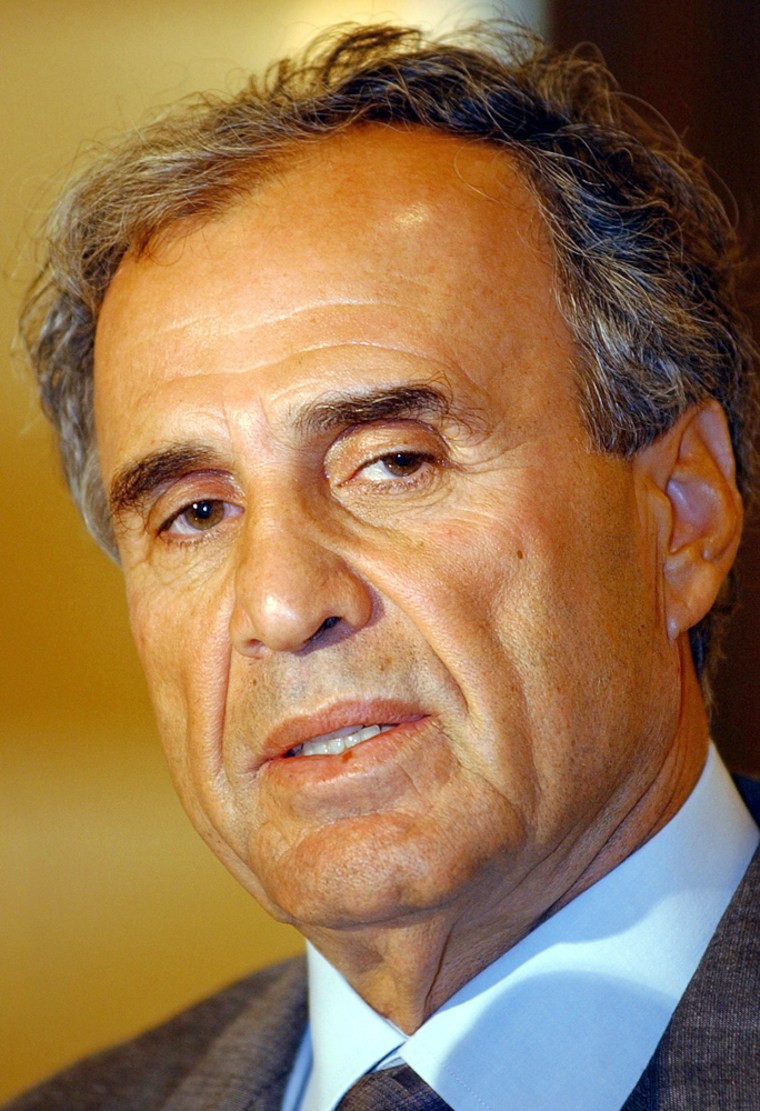Syria’s interior minister, who ran Lebanon for many years and was one of several top officials caught up in the U.N. probe of the slaying of that nation’s former prime minister, died Wednesday. The country’s official news agency said he committed suicide.
The death of Brig. Gen. Ghazi Kenaan — just days before the final U.N. investigation report is due — was a new and startling sign of turmoil in Syria, whose authoritarian regime is girding for the chance that the U.N. report might implicate high-ranking officials in the assassination of former Lebanese premier Rafik Hariri. He was killed by a bomb in February as his convoy drove through Beirut.
“Interior Minister Brig. Gen. Ghazi Kenaan committed suicide in his office before noon,” the Syrian Arab News Agency reported.
Information Minister Mahdi Dakhlallah told Al-Arabiya TV the death would not affect political stability in Syria. He said the “painful incident” was under investigation.
In Lebanon, where TV stations broke into regular programming with the news, Prime Minister Fuad Saniora said he had no details on the death of Kenaan, who effectively controlled Lebanon as Syria’s intelligence chief there for about 20 years.
“May God have mercy on him,” Saniora said.
A prominent Lebanese legislator and journalist, Gebran Tueni, cast doubt on the report.
“It is not known for sure if he committed suicide, or was made to commit suicide,” Tueni told Al-Arabiya from Paris. “In Syria, there are some people who want to hide the facts, and don’t want everything about the Syrian period in Lebanon to be known.”
Hinted at death on radio
Hours before he died, Kenaan, 63, told a Lebanese radio station: “I believe this is the last statement that I can make.” He confirmed speaking to U.N. investigators but denied a recent report that he told them about corrupt Syrian officials.
Syrian opposition figure Ali Sadr el-Din Bayanouni, the London-exiled leader of the banned Syrian Muslim Brotherhood group, told Al-Jazeera that Kenaan’s statement “indicated that he felt in danger, and this supports rumors that there has been a deal in which the Syrian regime might sacrifice some of its heads for saving the regime.”
The interior minister in Syria controls the police. But before Kenaan was promoted to minister in 2003, he was Syria’s intelligence chief in Lebanon, a position that conferred enormous power. Syrian intelligence controlled the hiring and firing of Lebanese officials and every aspect of political and military life.
President Bashar Assad told CNN in an interview earlier Wednesday — before Kenaan’s death was announced — that if the U.N. murder probe had any material proof of Syrian involvement, those involved would be charged with treason and could be handed over to an international court.
Lebanese newspapers have reported that Kenaan was among seven senior Syrian officials questioned last month by the U.N. team investigating the death of Hariri. The other officials included Syria’s last intelligence chief in Lebanon, Brig. Gen. Rustum Ghazale, and his two aides.
The investigators have named as suspects four Lebanese generals who are close to Syria; they are under arrest. The U.N. report is due by Oct. 25.
Many Lebanese believe Syria played a role in Hariri’s killing. The Syrian government has denied involvement, but Syria dominated Lebanese political life until mass demonstrations and international pressure forced it to withdraw its troops from Lebanon at the end of April.
The suspects, according to Arab media reports, include senior Syrian security officials, members of Assad’s inner circle and relatives. Some family members hold positions in the intelligence and security services.
U.S. blocked his assets
In June, the U.S. government moved to block the financial assets of Kenaan and another Syrian general. The step indicated that Washington was turning up the heat on Syria, accused of backing anti-American insurgents in Iraq and Palestinian militant groups opposed to U.S.-led Mideast peace efforts.
The United States has imposed economic sanctions on Syria, long on the State Department list of states sponsoring terrorism.
The big question in Syria is how long Assad can last if the probe indicates his government played a part in Hariri’s death. The regime is not very popular, but it has little opposition and any revolt would likely be pinned on the United States, which Syrians blame for the Iraqi insurgency.
Many Arab countries, notably Saudi Arabia and Egypt, have been quietly pressing Assad to turn over any officials who may be implicated in the U.N. report.
Syria is reportedly planning a diplomatic offensive to discredit the report, which would include reaching out to China, India and Russia to help block a U.N. resolution and possible sanctions.
